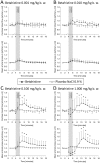Betahistine exerts a dose-dependent effect on cochlear stria vascularis blood flow in guinea pigs in vivo
- PMID: 22745706
- PMCID: PMC3380058
- DOI: 10.1371/journal.pone.0039086
Betahistine exerts a dose-dependent effect on cochlear stria vascularis blood flow in guinea pigs in vivo
Abstract
Objective: Betahistine is a histamine H(1)-receptor agonist and H(3)-receptor antagonist that is administered to treat Menière's disease. Despite widespread use, its pharmacological mode of action has not been entirely elucidated. This study investigated the effect of betahistine on guinea pigs at dosages corresponding to clinically used doses for cochlear microcirculation.
Methods: Thirty healthy Dunkin-Hartley guinea pigs were randomly assigned to five groups to receive betahistine dihydrochloride in a dose of 1,000 mg/kg b. w. (milligram per kilogram body weight), 0.100 mg/kg b. w., 0.010 mg/kg b. w., 0.001 mg/kg b. w. in NaCl 0.9% or NaCl 0.9% alone as placebo. Cochlear blood flow and mean arterial pressure were continuously monitored by intravital fluorescence microscopy and invasive blood pressure measurements 3 minutes before and 15 minutes after administration of betahistine.
Results: When betahistine was administered in a dose of 1.000 mg/kg b. w. cochlear blood flow was increased to a peak value of 1.340 arbitrary units (SD: 0.246; range: 0.933-1.546 arb. units) compared to baseline (p<0.05; Two Way Repeated Measures ANOVA/Bonferroni t-test). The lowest dosage of 0.001 mg/kg b. w. betahistine or NaCl 0.9% had the same effect as placebo. Nonlinear regression revealed that there was a sigmoid correlation between increase in blood flow and dosages.
Conclusions: Betahistine has a dose-dependent effect on the increase of blood flow in cochlear capillaries. The effects of the dosage range of betahistine on cochlear microcirculation corresponded well to clinically used single dosages to treat Menière's disease. Our data suggest that the improved effects of higher doses of betahistine in the treatment of Menière's disease might be due to a corresponding increase of cochlear blood flow.
Conflict of interest statement
Figures


References
-
- Menière P. Pathologie auriculaire: mémoire sur des lésions de l’oreille interne donnant lieu à des symptômes de congestion cérébrale apoplectiforme. Gazette médicale de Paris. 1861;16:597–601.
-
- Thorp MA, James AL. Prosper Ménière. The Lancet. 2005;366:2137–2139. - PubMed
-
- Neuhauser HK. Epidemiology of vertigo. Curr Opin Neurol. 2007;20:40–46. - PubMed
-
- Pullens B, van Benthem PP. Intratympanic gentamicin for Meniere’s disease or syndrome. Cochrane Database Syst Rev. 2011. CD008234 - PubMed
Publication types
MeSH terms
Substances
LinkOut - more resources
Full Text Sources
Other Literature Sources

